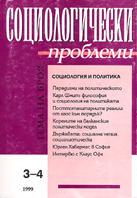Корените на балканския политически модел: пагубно съчетание между национализъм и слаборазвитост
Roots of the Balkan Political Model: A Pernicious Combination of Nationalism with Underdevelopment
Author(s): Victor Roudometof, Stefan NikolovSubject(s): Social Sciences
Published by: Институт по философия и социология при БАН
Summary/Abstract: Proliferation of nationalism in Greece, Serbia, and Bulgaria over the 1880–1920 period is closely linked to the underdevelopment and statist tradition of the local societies. The consolidation of a freeholder peasantry led the Balkan elites to use the state as a mechanism of fiscal extraction and income redistribution toward the state-dependent urban strata. In turn, support for irredentism came mainly from groups associated with the state. Over the 1880–1920 period, such groups championed the nationalist agenda, with the military corps on the forefront. For their part, the peasantry and the parties supported by the peasantry adopted a passive or even openly hostile attitude toward that agenda. The belated liberation of Bulgaria and the specific circumstances of this liberation somewhat set the country off from its neighbours, but not to the point of contradiction with the general pattern. It is argued that this socio-economic pattern continues to plague the Balkans to this day, calling forth politicians capable of using nationalism to justify the appropriation of state resources toward their clientele.
Journal: Социологически проблеми
- Issue Year: 31/1999
- Issue No: 3+4
- Page Range: 146-163
- Page Count: 18
- Language: Bulgarian
- Content File-PDF

